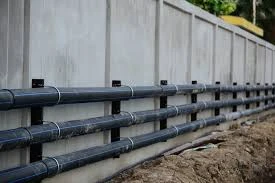Dec . 11, 2024 10:01 Back to list
High-Density Polyethylene Pipes for Agricultural Use and Efficiency Optimization
The Benefits of HDPE Agriculture Pipes in Modern Farming
High-Density Polyethylene (HDPE) pipes have revolutionized agricultural practices, providing efficient solutions for irrigation and water management. Renowned for their durability, flexibility, and cost-effectiveness, HDPE pipes are becoming increasingly popular in the agricultural sector. This article explores the various advantages of HDPE agriculture pipes, as well as their application in enhancing farming productivity.
Durability and Longevity
One of the key benefits of HDPE pipes is their impressive durability. Unlike traditional materials such as concrete or metal, HDPE pipes are resistant to corrosion, rust, and chemical degradation. This resistance ensures that they maintain their integrity over time, significantly reducing the need for frequent replacements. Farmers can invest in HDPE pipes with the confidence that they will withstand the rigors of agricultural use, including exposure to varied weather conditions and soil types.
Additionally, HDPE pipes have a long lifespan, often exceeding 50 years. This longevity translates into lower maintenance costs and fewer disruptions in water supply, which are critical in maintaining crop health and maximizing yields.
Lightweight and Flexible Design
Another advantage of HDPE pipes is their lightweight nature, which makes installation and handling much easier compared to traditional piping materials. Farmers can quickly lay down extensive networks of pipes without the need for heavy machinery. The flexibility of HDPE pipes allows them to be bent and curved around obstacles, making them ideal for use in irregular terrain commonly found in agricultural settings.
This flexibility also means that HDPE pipes can adapt to varying soil conditions and can be installed both above and below ground, providing versatility in design and application.
Superior Water Management
hdpe agriculture pipe

Efficient water management is essential in agriculture, particularly in arid regions where water scarcity is a pressing concern. HDPE pipes facilitate effective irrigation systems, allowing for the precise delivery of water directly to the root zones of crops. This targeted approach minimizes water wastage and ensures that plants receive the optimal amount of moisture they need for growth.
Furthermore, HDPE pipes are often used in drip irrigation systems, which are known for their efficiency. These systems deliver water slowly and directly to the soil, greatly reducing evaporation and runoff. As a result, farmers can conserve water resources while maximizing crop yields.
Resistance to Environmental Factors
Agricultural practices are often subject to various environmental challenges, such as UV radiation and extreme temperatures. HDPE pipes are designed to resist these harsh conditions, ensuring reliable performance throughout their lifespan. The material's ability to withstand temperature fluctuations means that farmers can use these pipes in diverse climates without fear of degradation.
Additionally, HDPE pipes are resistant to biofilm and bacterial growth, making them a hygienic choice for transporting water for irrigation. This property helps in maintaining the quality of water, which is crucial for healthy crop production.
Cost-Effectiveness
The initial investment in HDPE pipes may be higher than traditional materials, but the long-term savings are undeniable. The durability, reduced maintenance needs, and efficient water management capabilities lead to significant cost savings for farmers over time. These pipes not only enhance the productivity of agricultural operations but also contribute to sustainable farming practices by conserving vital water resources.
Conclusion
HDPE agriculture pipes represent a significant advancement in modern farming techniques. Their durability, flexibility, and efficiency make them an ideal choice for irrigation and water management systems. By adopting HDPE pipes, farmers can achieve better crop yields while minimizing water usage, ultimately contributing to sustainable agricultural practices. As the demand for efficient and environmentally friendly farming solutions continues to grow, the use of HDPE pipes is likely to become even more prevalent in the agricultural industry.
-
HDPE Natural Sheet: Durable, Food-Grade & Versatile Plastic Solutions
NewsAug.27,2025
-
Durable Glossy PVC Rigid Sheet | Premium High-Shine Panels
NewsAug.26,2025
-
Durable PP Rigid Sheet: Lightweight, Chemical Resistant Solutions
NewsAug.21,2025
-
PVC Grey Sheet for Extraction: Chemical Resistant & Durable
NewsAug.19,2025
-
Durable PVC Pipe Fittings for Plumbing & Irrigation Needs
NewsAug.18,2025
-
HDPE Steel Belt Reinforced Spiral Corrugated Pipe | High Strength
NewsAug.17,2025

